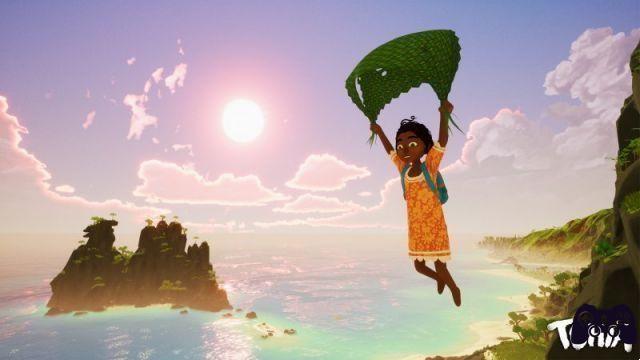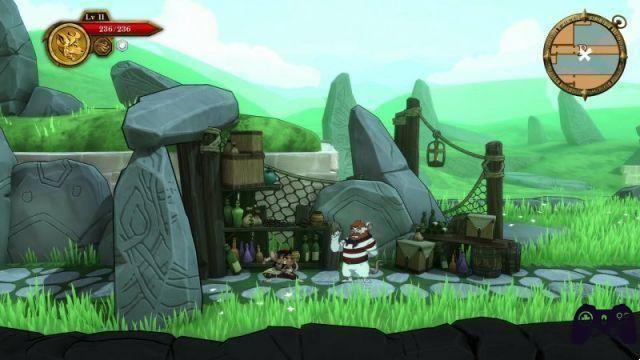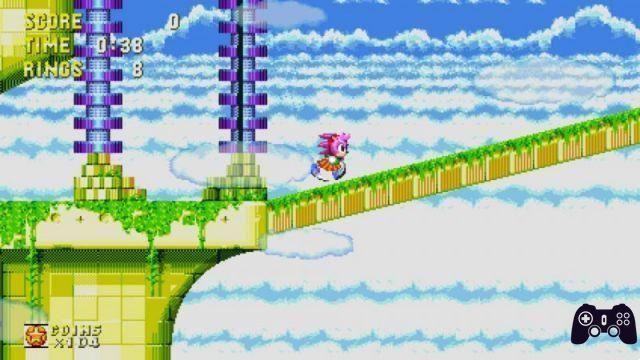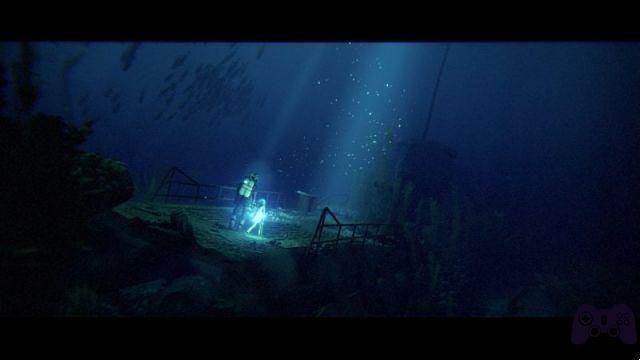"Terre de parole, terre de partage": "land of the word, land of sharing." This is the motto of New Caledonia, the French overseas community and place of origin of the co-founders of avaceb. It is an extraordinary archipelago, endowed with astonishing biodiversity - many of the species that make up its flora and fauna are endemic, that is, they are found only in that region - that separated from the supercontinent Gondwana about 85 million years ago. Since then, evolution has followed different paths from the rest of the world, and today the islands of New Caledonia are a destination for scholars and scientists, as well as for initiatives aimed at protecting the very particular forms of life that live in the archipelago.
We can say that Tchia also has a very similar objective: that of spread knowledge of culture., of the human and non-human landscapes and animals that populate New Caledonia. The barrier between animal species in Tchia is broken down by the Soul Leap mechanic, characteristic of the protagonist, a little girl who discovers that she is endowed with magical powers that allow her to "possess" animals and objects found on the islands and in the ocean. This allows for the adoption of always new movement solutions in this open world that is not very extensive, but certainly varied, creating an animated sandbox system that is very stimulating, although not without its flaws.
We tell you about this adventure in a tropical open world in ours. Tchia review.
A very special archipelago

Upon starting Tchia, the player receives a note from the developers explaining where the New Caledonia, homeland of the co-founders of Awaceb, who developed the video game as "a kind of love letter addressed to this very special place." It is no coincidence that the end credits show footage of the team's trip to New Caledonia: the developers met Tchia's musicians and voice actors, local people who gave voice and soul to the characters and their adventures, and explored the beaches, reef corals, the forests of the archipelago.
On dubbing, Awaceb's preliminary note explains the choice to do it only in Drehu (one of the languages spoken by the indigenous people of New Caledonia) and in French, the national language: it is a direction taken for cultural reasons, and we can affirm that, too thanks to the excellent subtitles and Translation to Spanish, we fully appreciate and understand this decision, backed by the excellent performance of the entire cast. The same goes for the island's musicians and choirs: Tchia's adventure is punctuated by moments of intense emotion, expressed with traditional songs and motifs, often performed in a group. The possibility of participating by playing the ukulele, but also castanets and dried fern leaves, is very welcome, although it is completely optional. In fact, if you want to live in the moment without thinking about keeping up, you can press a special button, relax and not worry about the musical performance. The developers' note concludes by stating that Tchia is a fictional game and that many names and cultural details have been changed out of respect.
Fortunately, the same does not happen with the forms of animal and plant life that can be admired in the Awaceb archipelago, inspired not only by the islands of New Caledonia, but also - and above all - by the living beings that inhabit them, especially everything and below the surface of the ocean. As we mentioned at the beginning, Tchia's most distinctive power is Soul Leap., which allows the girl to take control of animals and objects. Many animals are endowed with particular abilities: for example, the kagou (a bird endemic to New Caledonia and unfortunately in danger of extinction) can bark like a dog; Cats, on the other hand, have the ability to see in the dark. These features don't always have a significant impact on gameplay, but they certainly help create variety and opportunities to take on the role of beings that normally go unnoticed.
The thief

The adventure begins with the story of an old woman to a group of children: the woman tells the story of our Tchia, from the day her father Joxu gives her a slingshot and a glider to plan. They will be two fundamental instruments in the little girl's journey, who experiences moments of initial carefree playing and singing with her father and Tre, the friend who brings them supplies to Uma, the remote island of the archipelago where Joxu and Tchia live. The spell is soon broken by the mysterious Pwi Dua, a sorcerer who, with the help of two animated mannequins made of cloth, kidnaps Tchia's father, with whom he appears to have had an affair. Desperate, the girl discovers that she has the power to penetrate animals and objects: she is possessed by the machete wielded by the evil Pwi Dua, she wounds him in her face and then the enraged sorcerer throws her into the sea. Having woken up in Tre's camp, Tchia sets off the next morning in search of her father, crossing the ocean in the boat that her faithful Tre gave him.
Even in this hectic context, one word is often repeated and stands out from the rest, revealing itself as Tchia's true leitmotif: "thief", "thank you" in the Drehu language. Tchia is a story of gratitude and openness, of sharing (that "participation" that New Caledonia's motto speaks of) and of self-discovery. Awaceb often does not delve into the torments of Tchia and his secondary characters, affected several times during the adventure by loss and suffering, but rather outlines a simple plot, not without surprises, and capable of taking the player by the hand towards what For the team it is more important: the discovery of the values, the panoramas, the ecosystems of New Caledonia. In this sense, it can be said that the objective has been fully achieved: in all ten hours necessary to complete the adventure - we specify that we allow ourselves more than one digression before the end, after which we can resume the exploration, in a way elegantly justified from the narrative point of view - we were always surprised by the setting and its colors, of the alternation of day and night, of the colored clouds that emerge behind the mountains of the islands. In other words, Tchia is a triumph of beauty and it is impossible not to be captivated by the charm of the Awaceb archipelago, also thanks to the particular mechanics implemented by the developers to ensure lively and participatory exploration.
Nei panni del kagou

It is known that ocular heterochromia usually indicates, in the world of video games, the presence of magical powers in our protagonist. Tchia has one brown eye and one green eye, and in the first moments of the adventure we discover with her that the latter guarantees her the possibility of performing the Soul Leap, that is, taking control of objects or animals present nearby until the soul is empty 'Soul indicator. There are more than thirty animals controllable by Tchia: They range from birds (such as the aforementioned kagou or the very intelligent New Caledonian crow), to reptiles (the giant gecko), mammals (the flying fox) and fish (including the majestic Napoleon wrasse). To these are added numerous objects, from lamps to stones, in which Tchia can enter, move around the environment and interact with it and with enemies in various ways: controlling an object you can aim and throw it, abandon possession of it and then, if you want, recover the control. again, performing spectacular aerial acrobatics and covering great distances in a very short time. It is also possible to move around by swaying the tops of the trees and palm trees and thus circling the islands, all brilliantly characterized, with the presence of varied biomes (mangroves, forests, grasslands...).
The Soul Gauge can be improved by addressing the Totem Shrine Challenges, whose doors are opened only by carrying a totem carved in the required manner and eating the soul fruits they contain. This is one of the many activities that animate Tchia and that are based on the traditions of New Caledonia: we have already talked about the possibility of playing instruments such as theukulele (our inseparable travel companion), but there is no shortage of other occupations, such as balancing rocks, intended to unlock new melodies that give Tchia special abilities. In this sense, we must point out how the possibility of evoking birds thanks to our ukulele entails a very strong facilitation of exploration, undoubtedly simplified (and, in the case of enemy fortresses, trivialized) by the possibility of floating in flight at any time. moment. except for a short cooldown for the relevant skill.

A very strong choice made by Awaceb is to Do not indicate the location of Tchia on the map.- The location (and movement at sea) of the ship is visible, but there is no marker highlighting the exact location of the protagonist. There map It can be accessed at any time at the bottom left of the screen, or you can use the compass; By pressing a button, Tchia will make a brief comment about the surrounding area (for example, "Tingeling Town is not far away") and a fairly large area will appear circled on the map, giving us a broad clue as to where we are. . This system leaves you confused at first, but we loved it after a few hours of playing: simply keep the map open and look around to learn your way around, having fun identifying monuments and places of interest.
Fire to the dust

There is no doubt: the weakest part of all Tchia is related to fighting against the tomorrows, the enchanted cloth mannequins controlled by Pwi Dua that dot the archipelago with its camps and fortresses. The objective is always the same: set them on fire using lanterns, pieces of wood or taking control of Wake up, ancestral spirits that do not usually interact with humans, but who promise their unconditional support to Tchia, and who have the ability to launch explosive projectiles. Tchia gains the ability to summon a Mwaken with one of the ukulele's tunes, but the Mwaken's limited movement capabilities make it only useful in small-sized contexts.
The adventure is divided into chapters., and at one point you find yourself facing three large Maano-controlled fortresses in quick succession. It is likely that the different exploratory capabilities guaranteed by the Soul Leap have generated some confusion and difficulty in the design of the Awaceb structures, which develop in a non-organic way, with large stretches without tools to attack the Maano that will soon surround us by everywhere. There are no real stealth options, although controlling a locust can be a great option to go relatively unnoticed, and with low resistance levels you may have difficulty dealing with the hordes of Maano who throw their webs at Tchia, threatening to suffocate her. These sections, if part of the main adventure, can be skipped with a specific menu option, but it's certainly a shame to see how they've been handled in an overall clunky and unfun way.

The destruction of the piles of tissues from which the Maano came reveals some coffins containing cosmetics for Tchia and to customize the ship. The variety of shirts, dresses, skirts, armor, hairstyles and jewelry with which to adorn Tchia is simply immense, and chests can be found in various places in the game world, not only in the Maano camps; Although they do not offer improvements, they are still a complement capable of inviting a careful exploration of the game world, above and below the blue ocean of this New Caledonia video game, which requires more or less twenty hours to reveal all its secrets to the player. . .
Colors, sounds and magic of Tchia.

Awaceb was able to create a captivating tropical environment for beauty and joy, based on quite realistic physics and truly stimulating sandbox mechanics, a bit like what happened with The Legend of Zelda: Breath of the Wild. Tchia stands out for the extraordinary colors of the archipelago: the intense pink of the sunrises and sunsets, the blue of the sky at noon, the emerald ocean and the changing coral reefs that hide beneath its surface. In our testing, we noticed occasional pop-up phenomena of trees, animals, and non-player characters on the stage, but nothing too intrusive or capable of compromising our immersion in the game world. Other small bugs were fixed in the release update, but not everything is fixed and hopefully in the coming weeks they will be fixed.
Tchia's sound accompaniment is predominantly diegetic and is based on the sounds of birds and other animals of New Caledonia; In some cases they come into play songs inspired by the traditional sounds of the archipelago to enhance the highlights of the scan. We really appreciated Tchia's soundtrack, in general, for its variety and, above all, for its ability to amplify the emotional aspects of the story, which often touches on very delicate topics.
Conclusions
Tested version PC with Windows digital delivery Epic Games Store Price 29,99 € Holygamerz.com 8.0 Readers (41) 6.7 your voteTchia's adventure is at its best in the exploration phases: exploring the islands in the skin of a deer, a bird or a gecko offers always new and completely different perspectives. Being able to switch between different points of view and abilities is the greatest strength of Awaceb's video game, which presents meticulous attention and a very clear love for New Caledonia. Pity about an unfortunate balance between the exploration and combat sections during the main adventure, with a concentration of the obligatory battles against the Maano in one particular chapter. In our opinion, this does not diminish the overall high quality of Tchia, capable of warming the heart with a story with a simply perfect ending and an unforgettable setting.
PRO
- The archipelago is a place full of wonders
- Excellent artistic direction.
- The mechanics of Soul Leap are very interesting and offer constant surprises.
- Simple story but well told.
AGAINST
- The combat sections are the Achilles heel of the production.






